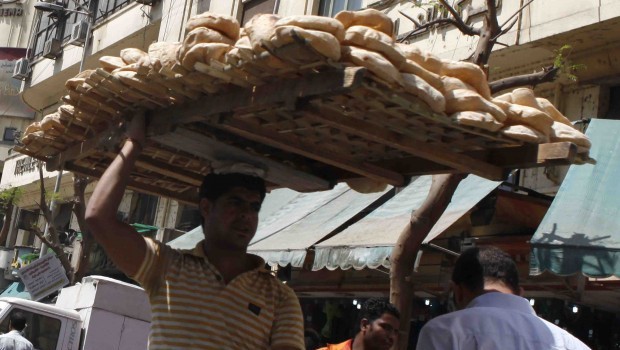
A man carries bread on wooden racks to be sold to customers in Cairo on April 11, 2013. (REUTERS/Amr Abdallah Dalsh)
London, Asharq Al-Awsat—Egypt is facing an uncertain economic future after parliament postponed its reading of a vital new income tax law needed to secure a USD 4.8 billion IMF loan.
The Egyptian parliament halted the reading of the controversial new income tax law on Monday, emphasizing that the government had failed to show who would be affected by the measure. The Shura Council’s Economic Committee postponed its approval of the new income tax draft law until later today, electing to discuss the 2013–14 budget instead.
The committee had earlier approved a number of income tax adjustments on Sunday.
Committee member Kamal Beshara revealed, “For those with an income of up to EGP 60,000, tax rates will be 15%. For those with an income of between EGP 60,000 to EGYP 100,000, tax rates will be 20%. For those with an income between EGP 100,000 to EGP 500,000, tax rates will be 25%, while for income above EGP 500,000, tax rates will be 30%.”
Shura Council speaker Ahmed Fahmy appeared visibly frustrated as he announced that the chamber would halt its final deliberations on the proposed income tax law as it did not possess the necessary government data.
Fahmy asked, “What finance ministry or tax authority does not know how to calculate the income bracket or who benefits and who is harmed?”
“This is not worthy of the council,” he added.
He told Shura Council members that the debate would be suspended “until the government provides correct data, otherwise this government can go wherever it wants to go.”
Egypt is in dire need of a proposed USD 4.8 billion IMF loan as the economic situation in the country continues to deteriorate. Despite this, two weeks of talks in Cairo earlier this month between Egyptian officials and an IMF team failed to produce an agreement. The long-awaited IMF deal is looking increasingly unlikely this week in the wake of a number of potentially debilitating setbacks.
Egyptian Deputy Finance Minister, Hany Kadry, who has served as a key Egyptian negotiator with the IMF, announced his resignation on Sunday, in what may represent a blow to Cairo’s prospects for an early IMF deal.
Kadry is a senior technocrat who was appointed in 2007; he survived five finance ministers in office appointed since the 2011 revolution.
“The only comment I can make for the time being is that, yes, my term ends on April 30, according to my resignation, which I submitted in December,” Kadry told Reuters.
“My next move is not decided,” he added.
One European diplomat, speaking to Reuters on the condition of anonymity, warned of the consequences of Kadry’s resignation, claiming that he was the one expert in the ministry who fully understood the IMF programme and was able to deal with the global lender professionally.
Egypt’s Al-Watan newspaper reported that Kadry had resigned after coming under pressure from the Freedom and Justice Party (FJP)—the political wing of the Muslim Brotherhood—adding that the former deputy finance minister had clashed with Abdallah Shehata, FJP advisor to the Egyptian finance minister.
Egypt’s MENA state news agency reported Tuesday that Shehata has been appointed to manage negotiations with the IMF in the wake of Kadry’s resignation.
In addition to this, opposition National Salvation Front leader Hamdeen Sabahi chose this week to publicly come out against the IMF loan. The Nasserite leader—who came third in the 2012 presidential election—told Reuters that Cairo should refuse the IMF loan rather than submit to terms that would further impoverish the country and spark a revolution of the hungry.
“If you look at any country the IMF has gone into, you will find that poverty has increased,” he said, adding, “talk about plugging a budget deficit does not get food to the people.”
He warned that “if the political situation remains unchanged, the January 25 revolution will be followed by a new wave that could erupt due to poverty once the IMF conditions are implemented and there will be a revolution of the hungry.”
